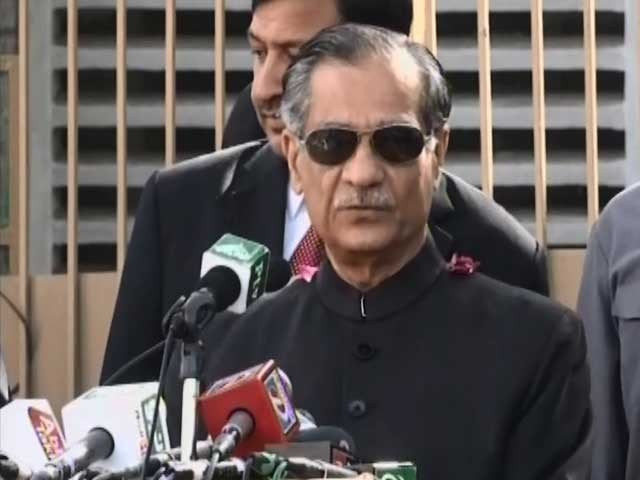Caretaker PM should oversee water issues
MCI submit report on Islamabad in apex court

Mian Saqib Nisar: PHOTO:EXPRESS
A three member bench headed by Justice Nisar was hearing a suo-moto case pertaining to water shortage.
“Who is responsible for this crisis? We receive reports but there is no progress,” he observed. “Why isn’t the policy being implemented,” he said.
During the hearing, the CJP also asked how the caretaker set-up can function with only five ministers.
Justice Nisar further requested caretaker Prime Minister Nasirul Mulk to personally oversee matters related to the water and power crises and suggested that the premier should schedule a conference on the water crisis.
CDA’s apathy closes water treatment plants in Bahawalpur
Earlier, attributing the shortage of water in Islamabad and Rawalpindi to nonpayment of outstanding dues, the Metropolitan Corporation Islamabad (MCI) has told the apex court that the Rawalpindi Cantonment Board (RCB) and the Water and Sanitation Agency (Wasa) owe it Rs8.6 billion.
The MCI has submitted a report to the Supreme Court through Additional Attorney General Nayyar Rizvi in a suo motu case regarding the shortage of water in the twin cities. The report says the main reason for poor management of water supply schemes in the cities is nonpayment by government institutions.
Highlighting the issues related to water shortage, the report reveals that the RCB and WASA Rawalpindi are the main defaulters of the MCI and they owe the MCI almost Rs8.6 billion.
“The recovery of dues amounting to Rs8,598.089 million from RCA, WASA and IESCO shall play a pivotal role to help the MCI provide the municipal services to the resident of Islamabad. In addition to this amount, the Metro Bus Authority has to pay 1.05 per cent of the project cost to the MCI for water use”.
According to the MCI, the total domestic, commercial and industrial water demand of Islamabad is 120 million gallons per day (MGD), whereas the rural and urban areas’ total demand is 220 MGD. The normal production from available resources is 77.60 MGD, it adds.
Water supply tankers hike rates
It says the existing water resources have been tapped optimally and due to the ongoing development of the city and its population growth, a supply-demand gap persists in Islamabad.
The report says leakages from the existing water supply lines which have outlived their useful life and the unaccounted water loss constitute 30 to 40 per cent of the supplied water. “Illegal water connection and water theft is another big issue. There is a severe shortage of staff at MCI,” it says.
In order to maintain the existing water supply properly, the report says, there is a dire need of Rs1.646 billion in funding for the replacement of outlived water supply lines, construction of dams, and installation of tube wells.
As a long-term solution, it recommends a sustainable project for ‘conducting of water from Indus Water for Rawalpindi and Islamabad’. This project, conceived by the Capital Development Authority (CDA), is under way and Rs500 million have been earmarked for it in the PSDP 2018-19.
According to the report, the total number of water connections in Islamabad is 67,141. Out of these, 52,411 connections are given to housing units and 14,730 to commercial and industrial units and government institutions.
The present water shortage in Islamabad is mainly caused due to depletion of surface as well as ground water sources owing to less rainfall. Present water level in Simly Dam is 2,250 and dead level is 2,230.
It says special notices have been issued to all those persons who were found during a survey to have installed tube wells/hydrants and selling water through private tankers. These people have been asked to get an approval or NOC within seven days or face action according to rules and regulations.
The report say water shortage complaints are being attended through the MCI tankers services on first come and first service basis. There are 34 tankers for the city but only 21 of them are in operational condition
It says the average capacity to attend complaints is around 400-450. On daily basis, one third tankers are provided at the rate of Rs100 to domestic consumers and Rs1,000 for commercial purposes.
During the hearing, Aitzaz Ahsan, who is assisting the court in the case, urged the three-judge bench, headed by Chief Justice of Pakistan Mian Saqib Nisar, to convert this adversity into opportunity by directing the authorities to remove silt and sediment from the dams.
The bench asked all stakeholders to sit together and come up with a workable plan to deal the water crisis by tomorrow (Wednesday).



1725254039-0/Untitled-design-(24)1725254039-0-208x130.webp)















COMMENTS
Comments are moderated and generally will be posted if they are on-topic and not abusive.
For more information, please see our Comments FAQ